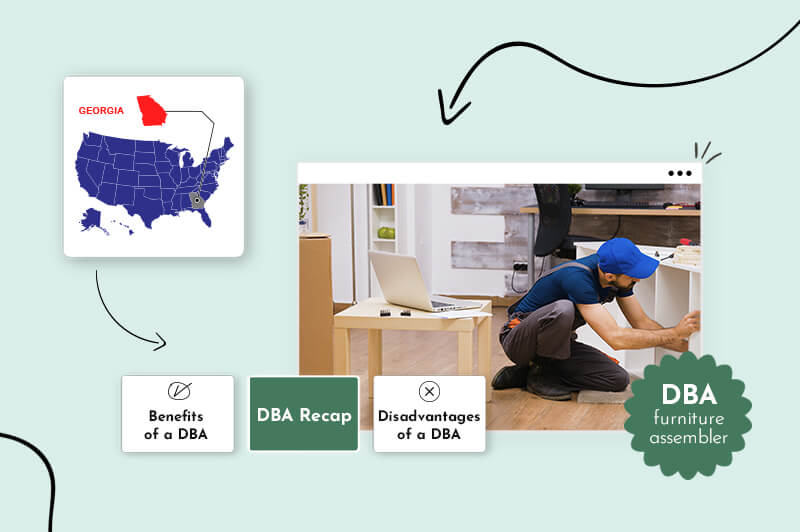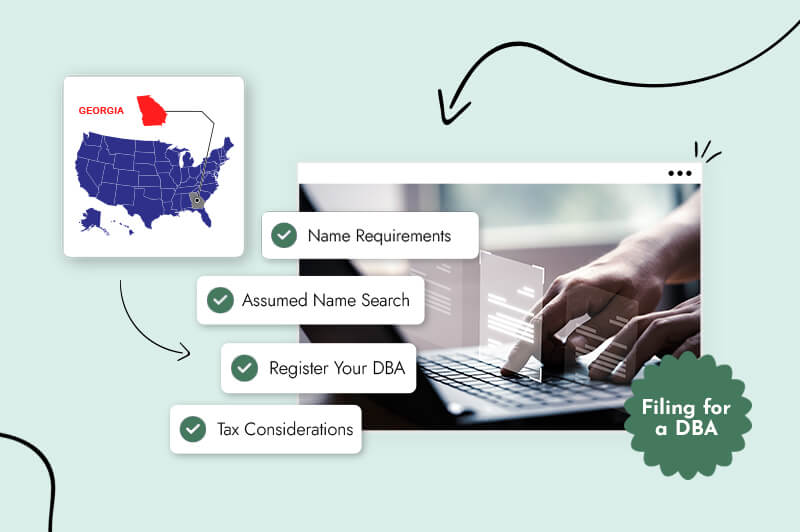There is more to obtaining and registering a business name than many people assume. As a new business owner, it is important to take time to establish your business name according to proper legal channels in Georgia. The state will not recognize your assumed business name if you fail to follow the expected steps when registering it.
When you look into how to get an LLC in Georgia, you’ll need to choose a business name to list on your articles of organization. The name you choose for this document is your legal business name. Sometimes, business owners opt to operate under a different name than the one they registered because it offers better brand recognition.
Georgia refers to alternative business names as a fictitious name, trade name, or doing business as (DBA) name. You do not have to register as an LLC to apply for a certificate of assumed or fictitious name.
What is a DBA (“Doing Business As”)?

Registering for a DBA in Georgia allows you to legally operate your business under a different name than what you registered when you filed your articles of incorporation. DBAs apply to all types of business structures, including sole proprietor, partnership, LLC, and corporation. State law requires you to register for a DBA in the same county you plan to conduct business.
Benefits of a DBA
Filing a DBA in Georgia is popular among business owners who want to create unique branding strategies for different customer groups. Other benefits of operating under a trade or fictitious name include:
- Allowing business name registration even if you do not have a business entity
- Not applying for an EIN as a sole proprietor or single-member LLC without employees
- Applying for multiple DBAs to represent different product lines
- Tax obligations and filing status remaining the same when operating under a DBA
- Protecting privacy by having payments go to the DBA instead of your personal name
Disadvantages of a DBA
You should also consider potential drawbacks of operating under an LLC with DBA to ensure that it is right for you. These include:
- Georgia DBA offering no liability protection because it is not a business entity
- Not retaining naming rights without applying for a trademark
- Not receiving any specific tax benefits when choosing to operate under a DBA
Keep in mind that you do not need to make this decision right away. You can also change your mind and go back to operating under your registered business name later, but you will need to notify your local county clerk of your decision.
Is having a DBA in Georgia a must?
Georgia does not require any business owner to file a DBA. The process is optional, and your decision to pursue it depends on whether you determine it is advantageous for your business or not.
Filing for a DBA in Georgia

Be sure to gather the information and paperwork you need before formally filing for a DBA in Georgia. For example, you must have decided on a trade name and be able to describe the nature of your business. You will also need the names and addresses of all company owners along with their notarized signatures.
Business naming requirements in Georgia
Georgia requires business owners who file for a certificate of assumed or fictitious name to list a distinguishable name. The term “distinguishable” means that it must be different enough from other business names in the state to avoid confusion among customers. Simply adding the words a, an, or the, changing phonetic spelling, making a word plural, adding punctuation, or adding a suffix does not make one business name distinguishable from another.
Begin with a Georgia assumed name search
You need to complete a Georgia Secretary of State business search to ensure that another business in Georgia has not already registered the DBA name you want to use. Creating a list of various alternatives can help you avoid disappointment if you find that another business has already claimed the DBA name you want to register.
Register your Georgia DBA
You are ready to file a DBA after you complete the “Application to Register a Business to Be Conducted Under a Trade Name” form and every person with an ownership stake in the business has had their signature notarized. Each Georgia county has its own version of this form that you can find on its website. You have 3 options for filing your DBA paperwork.
File online
To file your paperwork online, follow the instructions on how to submit a completed DBA application to the Clerk of Superior Court for your county. You can also find fee information specific to your county.
File by mail
You will need to locate the address for the Clerk of Superior Court and mail your completed form and fee to the county administrator. The cost to file a Georgia DBA by mail varies by county.
File in person
You can also bring your completed form and fee to the Clerk of Superior Court in person. The average filing fee as of 2022 is $172.
Whether you file online, by mail, or in person, Georgia law requires you to print a notice of your trade name registration in your local newspaper for two consecutive weeks. The newspaper must be the same one that the sheriff’s office in your county uses to print legal advertisements. Fees for printing your trade name registration vary, and you should retain a copy of the Publisher’s Affidavit to prove you have met this requirement.
Consequences of operating a DBA without registration in Georgia
You cannot enforce contracts when you operate your business under a name you have not registered with your local county. You will also be unable to open a business bank account as banks face heavy fines for allowing non-registered DBAs to do so.
Business owners who do not register a DBA may receive a misdemeanor charge in Georgia, which could also incur fines. You cannot file a lawsuit on behalf of the business and may be responsible for paying attorney’s fees as well.
Tax considerations
Filing a DBA in Georgia does not affect your business tax status or obligations in any way, since a DBA is not a legal business structure.
Conclusion
You can have as many DBAs as you can afford to register and have the time to operate. The Clerk of Superior Court in your county may take several weeks to process your application, depending on how many came in ahead of yours.
Your DBA designation does not expire. If you want to amend a current DBA, you will need to complete a new registration form and pay the applicable fee.
While waiting to receive notification that your county has processed your DBA application, be sure to establish a business website and a bank account separate from your personal finances.
